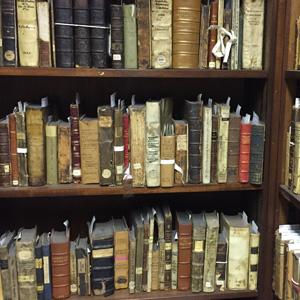Work Experience in the Archives
- Work Experience Placement
- Jul 3, 2017
- 3 min read

This week's blog post has been guest-written by work experience student, Natasha Wilkinson.
Hello! My name is Natasha Wilkinson, I am 16 years old, and for the past week starting the 26th of July I have been doing work experience with the Archives of the Jesuits in Britain. I wanted to do my work experience here because I am very interested in history and hope to pursue a career that is related to history in some way in the future. To begin with, I was unsure of what to expect from working in the archives, so the experience has been incredibly interesting and useful for me. My initial idea of what archive work would be like turned out to be a misconception, there are far less dusty old books involved than I thought and more work on the computer! I have learnt how to catalogue and calendar archives using software called Calm, I have learnt about the preservation and storage of archives and of course I have learnt a lot about the Jesuits in Britain during my time here.
Firstly, the basic principles and process of archiving was explained to me and I was given a tour around the archives. My favourite part of the archives is the room where all the really old books are kept, which has to be kept at a consistent temperature and humidity in order to prevent any further damage to the books. I was then given my first task, which was to catalogue some papers of a Jesuit chaplain during World War 1 called Fr. Raymond-Barker (1859-1955). I found this very fascinating because part of my interest in history is in the lives of individuals, and as part of the cataloguing I had to research and write a short biography of his life for the admin history. I was surprised by how much he travelled, not only throughout the whole of Britain teaching but also abroad on missionary work, and during his time in service.
Another individual I found out about was Fr. Richard Garrold (1874-1920), also a Jesuit who served as a chaplain in the armed forces during the First World War. I catalogued a number of the diaries he wrote in and illustrated during his time in the war. I liked one diary from January to July 1919 in particular, where he drew beautiful illustrations of scenery, buildings and people he witnessed during his extensive travels in the army on almost every page. I was amazed at the number of places he went to; East Africa, Egypt, India, Mesopotamia, Poona and Trichinopoly among the long list of places he served in. I later found out while writing his admin history and reading through his memoirs that he had always dreamed as a boy of visiting such faraway places that the war had allowed him to see, but upon reflection when he was at his deathbed in 1920 he realized that the sunset in Britain was just as beautiful as any other he saw during his travels. My favourite part of my work here this week was finding out such details about the lives and personalities of people in the past, therefore I really enjoyed cataloguing and researching his life and diaries, although I could not read his handwriting very well!

I also learnt how to properly preserve and store old photographs and spent a day looking through and packing away old photos of Beaumont and from a time when a Superior General visited the UK. One of the interesting things I came across here was an old photo of the Beaumont school dining hall, and there was a skinned tiger hanging on the wall as decoration!

I learnt how to calendar, which involved reading through a huge book of Victorian letters from the Jesuit mission to Guyana which began in 1857, and summarizing each letter’s contents in a spreadsheet. This was the most challenging task of the week for me, as I often found the handwriting completely unintelligible, and even when they were written neatly, the elaborate cursive of the letters was often confusing! However it was very satisfying when I could actually read and understand something correctly, so from this activity I learnt a lot about deciphering Victorian handwriting, and I definitely improved the more I tried! I also learnt about the way people in the 19th century wrote their letters, for example the Jesuits on this mission spent a lot of time complaining about their health, the weather, their salary and the insufficient number of Fathers of the mission! Finally, I catalogued some journals and financial records for Corpus Christi church in Boscombe.

Overall I have very much liked working at the archives, I have learnt a lot about archiving, and am now very interested in perhaps pursuing a career in archives. And finally, thank you so much Mary, Sally, and Lucy for having me here and everything you’ve done, I really enjoyed my experience!


Comments